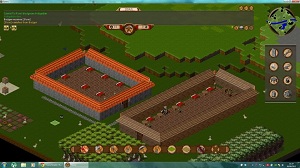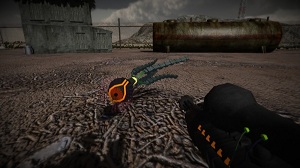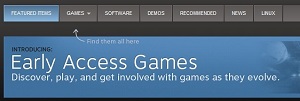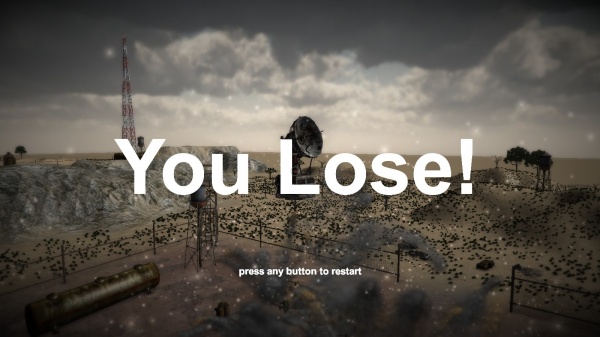Creative pursuits are hard. They’re expensive, time-consuming and quite often the only real indication of whether what you’ve done is any good or not is when it’s released to the public. They’re hard for the pros, and for those of us who it on a semi-professional/amateur basis the biggest struggle is often finding the time and/or energy to keep going. But at the end of the day, there’s two types of people: those who get there in the end, and those who don’t. Quite often, the difference between the two groups is simply one of passion or lack thereof ; other times, it can simply come down to the vision with which one enters into a project. Nothing will kill a creative project deader than people without a deadline or long-term plan, or any conception as to why these things are needed.
 The current age of crowdfunding is wonderful because it gives the former group the funding to do what they want; it’s also awful because it does the exact same for the latter group, not to mention those who would take advantage of the faith bestowed by consumers. Just ask Steam, which through its Greenlight and Early Access programs have stayed at the forefront of crowdfunding in the indie games scene to mostly positive results, but not without a few disturbing trends developing along the way. Seventeen months after having to take DayZ ripoff The War Z off their virtual shelves for false advertising, they’ve now had to do it again with sci-fi survival game Earth:2066 after a flood of complaints about its buggy, featureless state – one which Steam decided amounted to significantly less than the game’s blurb on the online marketplace promised. As a result Earth: Year 2066 has been pulled and unsatisfied punters offered a refund of the $20 they paid for this apparent lack of game. Steam’s statement:
The current age of crowdfunding is wonderful because it gives the former group the funding to do what they want; it’s also awful because it does the exact same for the latter group, not to mention those who would take advantage of the faith bestowed by consumers. Just ask Steam, which through its Greenlight and Early Access programs have stayed at the forefront of crowdfunding in the indie games scene to mostly positive results, but not without a few disturbing trends developing along the way. Seventeen months after having to take DayZ ripoff The War Z off their virtual shelves for false advertising, they’ve now had to do it again with sci-fi survival game Earth:2066 after a flood of complaints about its buggy, featureless state – one which Steam decided amounted to significantly less than the game’s blurb on the online marketplace promised. As a result Earth: Year 2066 has been pulled and unsatisfied punters offered a refund of the $20 they paid for this apparent lack of game. Steam’s statement:
“On Steam, developers make their own decisions about promotion, features, pricing and publication. However, Steam does require honesty from developers in the marketing of their games. We have removed Earth: Year 2066 from Early Access on Steam. Customers who purchased the game will be able to get a refund on the store page until Monday May 19th”
However, the fun hasn’t stopped there.
 Some of you may remember a game called Towns if you’ve been following Steam Greenlight from the beginning. One of the early inclusions on the service, the RPG city-builder sparked controversy by releasing as a beta before Steam had set its Early Access guidelines, and the general expectation was that the game would be a finished product. In February, after over a year of sporadic updates to a product that was no less buggy or still anywhere near completed, developers SMP handed over development duties to programmer Florian Frankenberger a.k.a. Moebius.
Some of you may remember a game called Towns if you’ve been following Steam Greenlight from the beginning. One of the early inclusions on the service, the RPG city-builder sparked controversy by releasing as a beta before Steam had set its Early Access guidelines, and the general expectation was that the game would be a finished product. In February, after over a year of sporadic updates to a product that was no less buggy or still anywhere near completed, developers SMP handed over development duties to programmer Florian Frankenberger a.k.a. Moebius.
In a statement released yesterday, Frankenberger has announced that after barely three months on the project he is stopping work on Towns:
Hi Everyone,
to be blunt I have a good and a bad news for you. Let me begin with the bad one as this is really a tough one:
I want to be completly honest with you guys, because I think as faithful fans of Towns you deserve to know the facts. The only thing I ask for is that you read my entire post and not just a few sentences. If you are angry at me after you read it that’s okay, just go ahead and post a comment.
When I signed up for working on Towns I was told that we sell a minimum of about x copies/month of the game. I agreed to work on Towns for 15% of what would remain after removing all the taxes and the Steam fee. Xavi and I agreed that this would be a fair amount, and I still think it is.
After getting used to the source code and publishing the first new version of the game, we talked about the agreed payment and it turns out that the sells (Sic) are getting down rapidly. So we are now selling less than a third of the x copies a month, loosing about 33% of sells per month.
To be completely honest, I can’t work for that little amount. I have to pay for the rent and food and this doesn’t really suffice for any of it  I also settled for the 15% of the minimum of x copies which is already well below my normal sallary.
I also settled for the 15% of the minimum of x copies which is already well below my normal sallary.
As some of you might know I already have a project that I’m not paid for (yet), so at the moment I can’t really afford having another one of that kind. So if I don’t really get paid for it then I would pledge for rather making Towns open source. That way I could still contribute to it (without payment) and have other people help me with that. But that is a decision that I have very little to say about …
I hope you are not too disappointed. And if you are: I’m really sorry. I’m quite new to indie game dev and I couldn’t really see that the game sales were declining that rapidly. I guess if I had more experience I would have seen it comming …
But after all Towns is a really great game and after reading through all your suggestions I realized that Towns as an idea has a lot of further potential. But the current game would need a lot of heavy changes to make them happen. And for that the game is just not new enough. But that brings me to that good news I mentioned at the beginning:
Xavi and I were talking about a possible Towns2 (sic). At the moment this is just in an idea stage and we can’t really say if he, I or eventually Ben have the time to create a Towns2. As faithful fans of Towns we would of course reward you in some way, when/if the new game is released.
A new game will give us the following advantages:
We can implement all the cool things that are not possible at the moment due to how the core mechanics works in Towns 1. We can also rise attention as this is a completely new game and a successor for once great runnning game
this will also make it possible to have a financially sound basis for a long development of Towns2.
I want to end this post by thanking you for reading this and for all your support in these two months. Again I’m sorry that we had to pull the plug right here, but I sincerely hope you can understand why we had to make that decision right now.
Moebius
Towns team
On the surface, it’s easy to sympathize with Frankenberger. Towns did sell well, at least initially (Some 200, 000 sales in total) so it’s easy to believe this idea that he was somehow hoodwinked into adopting the game under the belief that sales would still be healthy enough for him to thrive.
 But on closer scrutiny holes in his account become apparent. He didn’t investigate current sales of the game before agreeing to take on the project? Granted, he admits that he’s a newcomer to game development and was the victim of a lack of experience, but you have to wonder why in that case you’d take on a project already deemed late in developing by the community and already having garnered a bad reputation because of this (And if Steam cleared this change in development staff, or were even notified of it in the first place). Besides, you don’t have to be a veteran to know that if you’re already awaiting an overdue payment for another gig, as Frankenberger claims, you make absolutely fucking sure that any current jobs you take are guaranteed to pay you what you need.
But on closer scrutiny holes in his account become apparent. He didn’t investigate current sales of the game before agreeing to take on the project? Granted, he admits that he’s a newcomer to game development and was the victim of a lack of experience, but you have to wonder why in that case you’d take on a project already deemed late in developing by the community and already having garnered a bad reputation because of this (And if Steam cleared this change in development staff, or were even notified of it in the first place). Besides, you don’t have to be a veteran to know that if you’re already awaiting an overdue payment for another gig, as Frankenberger claims, you make absolutely fucking sure that any current jobs you take are guaranteed to pay you what you need.
Where it gets really weird is is when Frankenberger not only intimates that he might again work with Xavi Canal, the member of SMP who basically drafted him in to continue work on the game, but that this project may be a sequel to Towns. Teasing a sequel to an unfinished game made with the people who already bestowed on you a financially untenable duffer? Is that supposed to make people feel… better, or something? Because the fact is, people don’t. Not a little bit, and they’re right to not feel better. Even the most cursory glance at Towns‘s history reveals a product mismanaged from its very conception, and these two games an object lesson in the kind of people who shouldn’t be allowed anywhere near crowdfunding.
Now that Early Access is a familiar part of the Steam ecosystem and no longer a novelty, it seems about time that Valve set about redefining the boundaries of what developers can do – and what they need to do – to take part. For starters, strict guidelines have to be enforced on the semantics used both by Steam and by developers when they promote their games. Towns is an interesting example in that it was released for sale in that grey period where Greenlight existed but Early Access as an institutionalized avenue did not. The developers were probably lucky to slip into the Early Access system without getting in trouble, but the fact remains that not all developers are completely honest when writing their Steam blurbs, whether about the features available in their game on purchase or promised updates with no guarantee as to when they will be implemented, if ever.
 Long story short, Valve need to dust off the iron glove and demand that developers be more professional in their planning and general conduct and ensure that their policies do more to protect the consumer. One wonders what currently exists at a contractual level to ensure that developers meet specific goals in terms of updates or completion of the project, if such goals exist at all, and establish penalties if any of these goals are not met. The history of Towns‘s development (or lack thereof) also suggests that while it seems that Steam prefer to give devs as much autonomy as possible in developing their games, some kind of further supervision should be implemented – and that a total change of development staff, such as what happened with Towns, needs Steam’s approval. Furthermore, some level of assessment needs to be implemented to ensure that what does get put on sale when entering Early Access provides enough value in its current form to justify the price.
Long story short, Valve need to dust off the iron glove and demand that developers be more professional in their planning and general conduct and ensure that their policies do more to protect the consumer. One wonders what currently exists at a contractual level to ensure that developers meet specific goals in terms of updates or completion of the project, if such goals exist at all, and establish penalties if any of these goals are not met. The history of Towns‘s development (or lack thereof) also suggests that while it seems that Steam prefer to give devs as much autonomy as possible in developing their games, some kind of further supervision should be implemented – and that a total change of development staff, such as what happened with Towns, needs Steam’s approval. Furthermore, some level of assessment needs to be implemented to ensure that what does get put on sale when entering Early Access provides enough value in its current form to justify the price.
This may sound like a ‘how long is a piece of string’ kind of proposition, but this is quantifiable, at least in terms of enough content and playability to give a consumer an initial play period that feels reasonable for the cost. Next Car Game, for example, was put on sale with comparatively little content but won people over because it was simply so much fun to play. People who buy an Early Access game – at least, those with their heads screwed on straight – know that they’re essentially paying for the game as it exists at the point of purchase, and fully expect to not get all of the game’s features at once. What’s important is that the content is enjoyable enough to justify the price, and in those terms gameplay and performance need to be prioritized. It’s why, when we cover games in MCP U/C, we don’t bother with scores or any of the traditional review trappings because although you can’t review an unfinished game, you can impart to people an idea of who might get value out of it at this stage, and how effectively a game at this stage provides an enjoyable experience.
 Having said that, the understanding is always there that the game is still under development and that more content is forthcoming. This brings trust into the equation: people will gladly support a developer who stays working on a game, but devs who leave bugs untouched, don’t provide regular and substantial updates that bring meaningful additions to the game and generally seem content to let their product languish in Early Access ad infinitum not only invoke the ire of their customer base, but tarnish the public image of early access models and, ultimately, Steam’s reputation. There was a time not so long ago that Valve caught a lot of criticism for allowing Early Access projects to flood their online store, and while the general high quality of these games has ameliorated the discomfort to a large degree it won’t take too many high-profile disasters like these to swing public opinion back the other way.
Having said that, the understanding is always there that the game is still under development and that more content is forthcoming. This brings trust into the equation: people will gladly support a developer who stays working on a game, but devs who leave bugs untouched, don’t provide regular and substantial updates that bring meaningful additions to the game and generally seem content to let their product languish in Early Access ad infinitum not only invoke the ire of their customer base, but tarnish the public image of early access models and, ultimately, Steam’s reputation. There was a time not so long ago that Valve caught a lot of criticism for allowing Early Access projects to flood their online store, and while the general high quality of these games has ameliorated the discomfort to a large degree it won’t take too many high-profile disasters like these to swing public opinion back the other way.
At the end of the day, it’s about maintaining standards. The whole crowdfunding phenomenon may have taken off in part because of the creative freedom it gives developers, but good creatives in any industry still respect and adhere to professional standards, and are prepared to do the work necessary to secure and retain a loyal customer base. There are a lot of positives about the Early Access model, and a lot of good developers at all levels of expertise bringing us great games via that model, and it’s wholly possible to establish forms of regulation that won’t stifle creativity, but will stifle – or at least greatly inhibit – exploitation of the trust of the gaming public.
